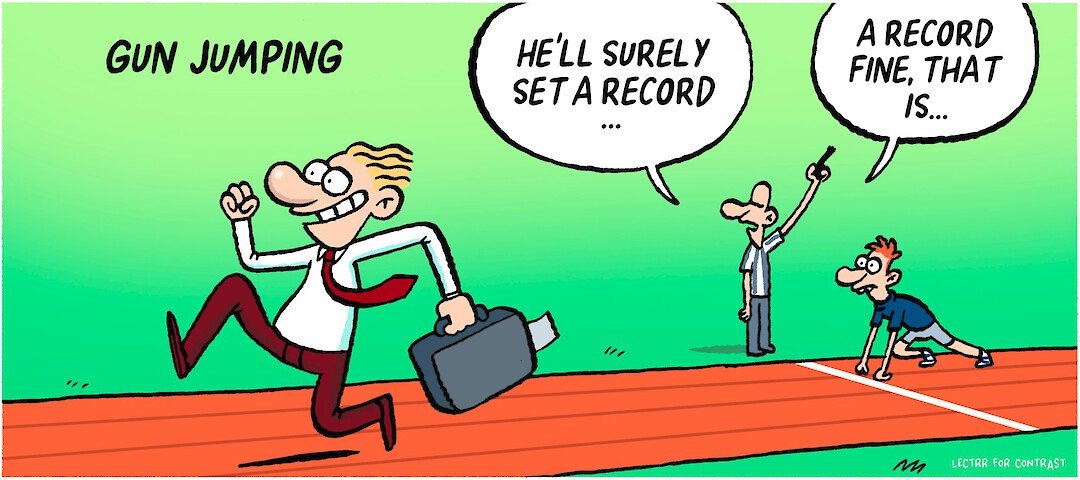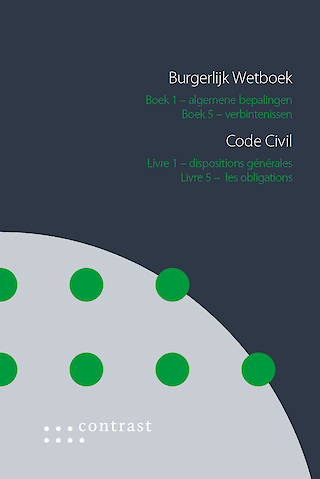In the Picture

Gun jumping? Don´t take off from the starting-blocks too quickly during an acquisition!
January 2022Imagine ...
You´ve been active for a very long time in the production and sale of high-end sports equipment. Two years ago you took over a hip American brand that focuses on sustainable high-end running shoes. The brand conquered the European market in no time. It never actually turned a profit, but it has a good reputation. Such a sustainable brand nicely complemented your existing line, especially since you have noted that your customers are increasingly looking for sustainable products.
The acquisition was notified to the European Commission and the share transfer only took place after the Commission had approved it. You also left the commercial policy of the target company untouched until the Commission had given its blessing. After all, your in-house counsel had sent you the In The Picture “Ready, set, stop… Go!” which explained why you had to wait until after approval in order to make any changes on that level. However you did incorporate a number of veto rights in the share transfer agreement. For example, in the period between the signing and the closing you could veto the dismissal and appointment of any director or manager as well as any changes to the sustainability criteria for new running shoes that the target company might wish to introduce.
Now, two years later, the European Commission accuses you of gun jumping, an infringement of the competition law that can entail a hefty fine.
Gun jumping? But you patiently waited for the approval to acquire the shares and get down to work with the management of the target company, didn’t you? So what´s the problem?
A brief clarification
Some transactions, such as acquisitions between companies that exceed certain turnover thresholds, are subject to the prior approval of the competition authorities. This is the notification obligation.
Such a transaction may not be implemented until it is formally approved. This is the so-called standstill obligation. Concretely, the companies involved must continue to act like independent entities until the competition authority grants its approval. In the case of an acquisition, the buyer may not exercise any control over the target company until that moment. An infringement of the standstill obligation is called gun jumping - where, metaphorically speaking, the companies take off from the starting-blocks like overeager sprinters before the starting shot (i.e. the approval) was fired.
The standstill obligation does not prevent companies, while awaiting this approval, from taking the necessary steps to prepare and plan the transaction. Unfortunately, the distinction between the preparation and planning, on the one hand, and the implementation of the transaction, on the other, is not always crystal clear.
The standstill obligation also does not prevent the buyer from receiving a number of rights relating to the behaviour of the target company between the inking of the transaction documents (signing) and the transfer of the ownership of the target company (closing). But these rights must not go too far. Recently the General Court of the European Union confirmed that the buyer, prior to approval of the transaction, may only exercise a decisive influence over the target company to the extent that this is strictly limited to what is necessary in order to protect the value or (and this is new) the integrity of the target company.
For example, a veto right over the appointment or the dismissal of senior management can be justified to protect the value of the company. By contrast, a veto right over the appointment or the dismissal of each director or manager, such as in our case, will quickly constitute gun jumping. A veto right on the sustainability criteria for the launch of the latest model of high-end running shoes will presumably not qualify as gun jumping. After all, you took the brand over because your customers are looking for more sustainable running shoes. Your veto right is thus necessary in order to safeguard the integrity of the target company, including its image as a sustainable company. In any event, a case by case analysis remains necessary. Otherwise you run (pun intended) the risk that your veto rights will qualify as gun jumping.
Finally, it is important to know that there can be gun jumping regardless of whether the transaction was ultimately approved.
Companies that commit gun jumping risk a fine that can run as high as 10% of their global turnover.
Concretely
- Always check whether your transaction has to be approved by the European Commission or one or more national competition authorities.
- If that is the case, both the notification obligation and the standstill obligation apply. These are two separate obligations, so it is possible for a company to fulfil its notification obligation yet be found guilty of implementing the acquisition before the competition authority had approved it. There is gun jumping if either of the two obligations is infringed.
- The gun jumping prohibition applies for all concentrations, not only for acquisitions, but also for mergers.
- The standstill obligation means that companies may not implement their concentration before it is approved by the competent competition authority (or authorities). In the case of an acquisition, prior to the approval a buyer may only exercise control over the target company if this is strictly limited to what is necessary to protect the value or the integrity of the target company. The concentration may of course be prepared and planned. Once the buyer has the approval in its pocket, it can no longer infringe the standstill obligation. But note carefully: until the acquisition has taken place (closing), the buyer and the target company remain two separate entities and they must respect the general prohibition on agreements restricting competition.
- The most recent judgment of the European courts is a clear warning shot. You come out of the starting-blocks faster than you might think. So, for each of the rights of the buyer over the behaviour of the target company prior to the approval, be sure to verify: is this right (and the scope thereof) reasonably necessary in order to protect the value or the integrity of the target company?
- Infringement of the notification obligation and the standstill obligation can each be separately sanctioned with fines up to 10% of the global turnover.
Want to know more?
- Read a summary of the most recent European case-law on gun jumping, in particular the judgment of the General Court of 22 September 2021 in the Altice case via this link. The full judgment is available via this link.
- Read the In The Pictures “Ready, set, stop… Go!” and “Do I have to notify my joint venture (and if so, where)?”.
- Contact the Merger Control team for more information about the contrast compliance programme as applied to concentrations between companies.
Please consult our website or contact one of our team members if you have questions or require more information:













